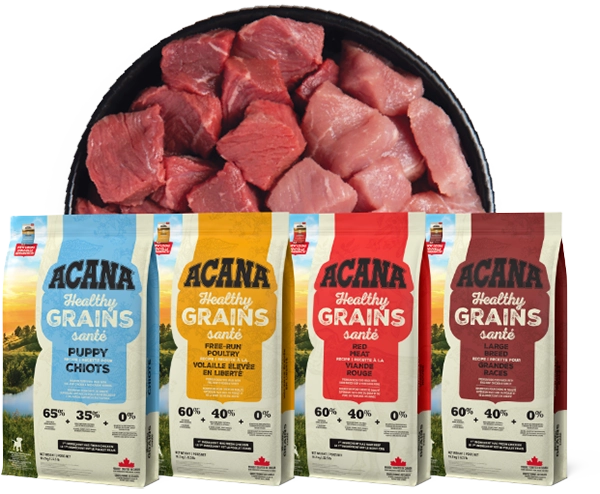
Grain-Inclusive Dog Food: A Path to Healthy Digestion and Happy Pups
In the ever-evolving world of pet nutrition, dog owners are constantly seeking the best ways to support their furry companions’ health and well-being. One topic that frequently sparks debate is the inclusion of grains in dog food. While grain-free diets have gained popularity in recent years, a closer look at grain-inclusive options reveals their potential benefits for healthy digestion and overall canine vitality.
Understanding the Role of Grains in Dog Food
Grains have been a part of canine diets for centuries, dating back to when dogs began scavenging for food alongside humans. These complex carbohydrates, when properly processed and incorporated into a balanced diet, can provide valuable nutrients and contribute to digestive health.
Common Grains Found in Dog Food
- Brown Rice: A whole grain rich in fiber, vitamins, and minerals. It is easily digestible and can help regulate bowel movements.
- Oats: Another excellent source of fiber, oats are known for their soothing properties and can be beneficial for dogs with sensitive stomachs.
- Barley: A nutritious grain that provides fiber, protein, and essential amino acids.
- Corn: Often misunderstood, corn can be a valuable source of energy and antioxidants in dog food. However, it’s essential to choose high-quality corn that is properly processed.
- Wheat: While some dogs may be sensitive to wheat, it can provide fiber and carbohydrates for those who tolerate it well.
The Digestive Benefits of Grain-Inclusive Diets
- Fiber Powerhouse: Grains are a natural source of dietary fiber, which plays a crucial role in maintaining a healthy digestive system. Fiber adds bulk to the stool, promoting regular bowel movements and preventing constipation. It also helps to regulate the speed at which food passes through the digestive tract, allowing for optimal nutrient absorption.
- Prebiotic Support: Certain grains, such as oats and barley, contain prebiotics, which are non-digestible fibers that nourish beneficial bacteria in the gut. These good bacteria help to maintain a healthy balance of gut flora, supporting immune function and preventing digestive upset.
- Soothing Sensitivities: For dogs with sensitive stomachs or digestive issues, certain grains like oats and rice can be gentle and easily digestible. They provide a source of carbohydrates without causing irritation or inflammation.
- Energy Source: Grains provide a sustained release of energy, keeping dogs feeling full and satisfied throughout the day. This is especially important for active dogs who require a higher energy intake.
- Nutrient Richness: In addition to fiber, grains contain essential vitamins, minerals, and antioxidants that contribute to overall health and well-being. These nutrients support immune function, promote healthy skin and coat, and protect against cellular damage.
Addressing the Grain-Free Trend
The popularity of grain-free diets has led some pet owners to believe that grains are inherently harmful to dogs. However, this is a misconception. Grain-free diets are not necessarily healthier than grain-inclusive diets, and they may even have potential drawbacks.
- Filler Concerns: In some grain-free formulas, grains are replaced with alternative ingredients like potatoes, peas, and lentils. While these ingredients can provide nutrients, they may not offer the same digestive benefits as grains. Additionally, some of these ingredients have been linked to potential health concerns, such as dilated cardiomyopathy (DCM) in certain dog breeds.
- Allergen Misconceptions: Many pet owners switch to grain-free diets believing their dog has a grain allergy. However, true grain allergies are relatively rare in dogs. Food sensitivities are more common and can be caused by any ingredient, including proteins and other carbohydrates.
- Nutritional Imbalances: Grain-free diets may not always provide a balanced nutritional profile. It’s essential to carefully evaluate the ingredient list and nutritional analysis of any dog food, regardless of whether it contains grains.
Choosing the Right Grain-Inclusive Dog Food
- High-Quality Ingredients: Look for dog foods that use whole grains as primary ingredients. Avoid products that contain excessive amounts of fillers, artificial additives, or low-quality ingredients.
- Balanced Nutrition: Ensure the dog food provides a complete and balanced nutritional profile, meeting the specific needs of your dog’s age, breed, and activity level.
- Digestibility: Choose grains that are easily digestible, such as brown rice, oats, and barley. If your dog has a sensitive stomach, opt for a formula specifically designed for digestive health.
- Veterinarian Consultation: Consult with your veterinarian before making any significant changes to your dog’s diet. They can help you determine the best food based on your dog’s individual needs and health condition.
Signs Your Dog May Benefit from a Grain-Inclusive Diet
- Irregular Bowel Movements: If your dog experiences frequent constipation or diarrhea, a grain-inclusive diet with adequate fiber may help regulate their bowel movements.
- Sensitive Stomach: Dogs with sensitive stomachs may benefit from easily digestible grains like oats and rice.
- Weight Management: The fiber in grains can help dogs feel full and satisfied, which can aid in weight management.
- Lack of Energy: Grains provide a sustained release of energy, which can be beneficial for active dogs or those who seem sluggish.
Transitioning to a Grain-Inclusive Diet
When switching your dog to a new diet, it’s essential to do so gradually to avoid digestive upset. Start by mixing a small amount of the new food with your dog’s current food, gradually increasing the proportion of the new food over several days or weeks. Monitor your dog’s stool and overall health during the transition.
Conclusion
Grain-inclusive dog food can be a healthy and beneficial option for many dogs. Grains provide essential nutrients, fiber, and prebiotics that support digestive health and overall well-being. By choosing high-quality grain-inclusive formulas and consulting with your veterinarian, you can ensure that your furry friend receives the nutrition they need to thrive. Remember, every dog is unique, and the best diet is one that meets their individual needs and promotes optimal health.

